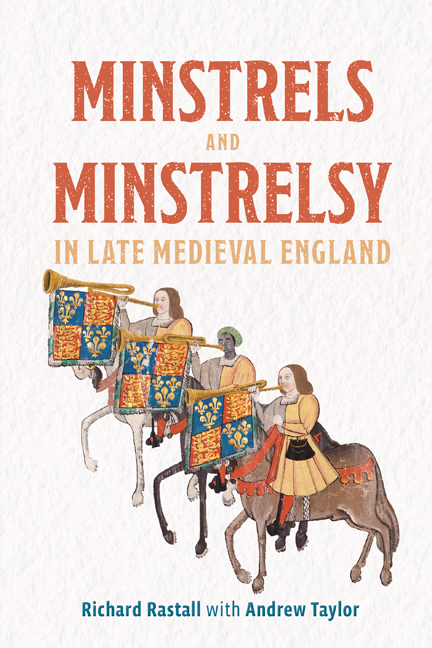Book contents
- Frontmatter
- Dedication
- Contents
- List of illustrations
- List of music examples
- List of abbreviations
- A note on references
- A note on money
- A note on dates
- Preface
- Acknowledgments
- Part I Minstrels and Minstrelsy in the Elite Households
- Part II Urban Minstrelsy
- Part III On the Road
- Part IV Minstrel Performance
- Envoi
- Bibliography
- Index
4 - Minstrelsy at Court
Published online by Cambridge University Press: 09 January 2024
- Frontmatter
- Dedication
- Contents
- List of illustrations
- List of music examples
- List of abbreviations
- A note on references
- A note on money
- A note on dates
- Preface
- Acknowledgments
- Part I Minstrels and Minstrelsy in the Elite Households
- Part II Urban Minstrelsy
- Part III On the Road
- Part IV Minstrel Performance
- Envoi
- Bibliography
- Index
Summary
Duties of the royal minstrels
The royal household minstrels fulfilled a wide spectrum of requirements, ranging from the most official ceremonial duties to the most nearly private entertainment for the king or other personage. Since almost the whole of a monarch's life was ‘official’, minstrelsy of various sorts must have been needed every day: and while there would be plenty of warning of any occasion needing large resources (such as a major feast or the arrival of a foreign ruler), some solo or small concerted minstrelsy might be demanded at any time. The four minstrels required at all times would have been enough for normal day-to-day requirements, with the rest of the minstrels coming to Court for the major feasts of the year. In theory this arrangement cut the costs of minstrelsy to a minimum; in practice, the year was full of minor celebrations and occasions for which more than the minimum minstrelsy was needed.
The only substantial extant account of the minstrels’ duties is in the Liber Niger of 1471–2. While this is late in our period, the ‘Black Book’ was based on earlier ordinances, and the basic outlines of a royal minstrel's work cannot have changed greatly for a long time. The minstrels played to announce meals. Outside the feasttimes when all the minstrels were present, this function was presumably carried out by the two trumpeters on permanent duty. Their other main function was to signal the king's position in the countryside when he went riding, so that the household could follow.
If the king wished it, the two trumpeters could be supplemented by two string-minstrels, bringing the resident minstrels to the four (two loud and two ‘still’) specified in previous ordinances. The still minstrels would be able to provide intimate entertainment: and if other still minstrels were present in Court there would be a wider range of possible minstrelsy.
The other nine minstrels specified by the Black Book were to come to Court
at v festes of the yere, and than to make theyre wages of houshold after iiijd. ob. a day if they be present in court; and than they to auoyde the next day after the festes be don.
- Type
- Chapter
- Information
- Minstrels and Minstrelsy in Late Medieval England , pp. 71 - 96Publisher: Boydell & BrewerPrint publication year: 2023

